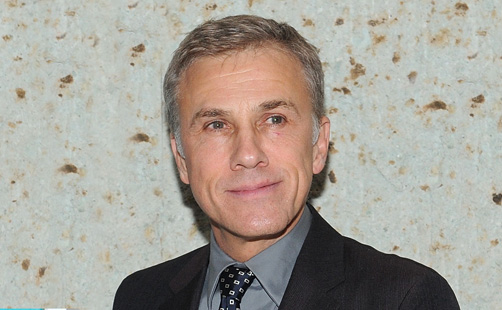
- Golden Globe Awards
Christoph Waltz (Big Eyes)
He has made a career out of playing villains. After two Golden Globes, two Oscars and his own star on the Hollywood Walk of Fame, Christoph Waltz is nominated for the lead in Tim Burton’s Big Eyes and will next play the most iconic among the bad guys – the Bond villain.Before his international breakthrough with Inglorious Basterds, the Viennese born actor was known in his native country as well as Germany for his portrayals of shady characters. Then Quentin Tarantino cast him as Colonel Hans Landa and subsequently wrote the part of Dr. King Schulz in Django Unchained for his “favorite Austrian” as he called him during his tribute on the Walk of Fame. To top off six years of continued success in Hollywood, Waltz’s next role is that of a Bond-baddie in Spectre, the 24th installment of the franchise.The actor does not like the term villain, and his nominated role as Walter Keane, the man who claimed credit for his wife’s art works was a more complicated character: “I don’t use the word villain anymore, I call it the “V” word because I don’t like it. I don’t regard the so-called villains that I have played as such, because I am always looking at understanding the psychology behind the person”.Having said that he does admit that in the Bond-films the villain is a staple: “In the Bond context the word is allowed. You are right, it is a tradition here and the Bond villain is an institution. But if this applies to me and my part is not so sure.” He is very cryptic about the film, but that is not because he is not under a gag order by the production to keep every little detail a secret: “I can basically tell you everything, all these speculations keep spinning the wheels. But obviously I won’t talk about the story because that would be shooting myself in the foot. I play a man named Franz Oberhauser, an Austrian.”Waltz chooses his roles in large part because of the director. After Tarantino he worked – among others – with Polanski, Gilliam and Burton. In Spectre it will be Sam Mendes: “Mendes is – aside from his talent –an incredibly accomplished director who has even more experience in theater. In his career he had to delve deeply into content and character, simply because he has done a lot of Shakespeare. And I consider this a wonderful combination that is always desirable.” Christoph Waltz himself has had a lot of experience with stage work. Throughout the eighties and early nineties he supported himself and his family by appearing in a wide array of plays in London. That may be one of the reasons for his excellent craft as Quentin Tarantino puts it: “On one hand he’s a master thespian, and on the other hand he’s also a tool box actor. He just gets the job done in a very unadorned way,” Tarantino says and diffuses any rumors that Waltz comes close to being a typical A-list diva on set: “Christoph chortles at the Hollywood actors with their assistants, with their miso soup, and their lemon with tea, waiting just off screen for them. When people complain about someone being in their eyeline, Christoph is the first person to say, well, I’ve done theater, there’s hundreds of people in my eyeline, dear boy, you’re fine.”Waltz himself sees it differently. He credits his late success for his reluctance to believe his own myth: “Absolutely, I now know what success means, what the implications and repercussions of success are and I know the other side of the coin. I’ve done this for 35 years, not always unsuccessfully either. I have a clear picture of why I want to be in this. Not just because of the reactions to my work but also because of introspection, and what I want to get out of it. At my age the gratitude bears weight, a weight that it wouldn’t have had had I become successful at 25. Then it would have been purely emotional. You become more grateful simply for having made it this far. The older you get the more aware you are of all the things that can go wrong. I had moments where I wanted to give up and I didn’t. Not because I am so good at sticking it through or so consequent but because I had no other way to make a living. Plus I am, without any noble intent, very stubborn and I don’t accept failure when I have a clear picture of where I want to go. To throw in the towel at that point would go against my stubbornness.” Which has clearly paid off.

